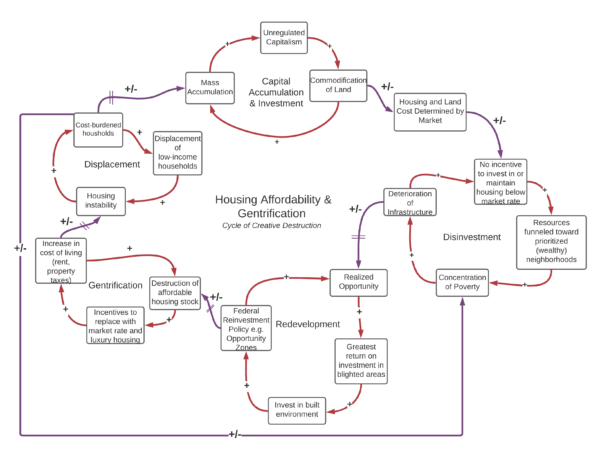By Hanes Motsinger


Two graduate students in Peabody College have been named runners-up in the Global Map the System competition, hosted by Oxford University’s Skoll Centre for Social Entrepreneurship.
Gracie Rule and Gretchen Trast won Vanderbilt University’s round of the contest, which is designed to challenge students to seek nontraditional solutions to social and environmental problems. They are the first Vanderbilt University team to advance to the global competition’s finalist round, based on their study of the housing affordability crisis in the real estate hotspot of Nashville: “Housing Affordability & Gentrification: A Systems View of Creative Destruction.”
The researchers, who are in Peabody’s master of education in community development and action program, examined how Nashville’s unfolding affordable housing crisis displaces and disenfranchises long-term, working-class residents in the city. They also offered an array of multifaceted, research-driven solutions that the city and its residents could consider to address the problem.
“Often, people who are unhoused are blamed for their individual circumstances, like addiction or underemployment,” Rule said. “Through this project, we wanted to better understand and bring attention to the fact that housing isn’t just a personal, individual issue. It’s a policy issue. It’s related to how we allocate resources and our values, and it’s connected to so many other factors in our society. We wanted to help people understand that there’s so much more to this problem than individual circumstances.”
Understanding the system of Nashville
Rule and Trast’s systems research investigated the root causes of Nashville’s affordable housing crisis, including the ways in which capital accumulation and investment, neighborhood disinvestment, redevelopment, gentrification and resident displacement produce the problem.
They then examined how stakeholders in the Nashville community—from state and local government to investors and developers to current residents—bring differing levels of interest and influence to solving the problem, a reality that creates power imbalances throughout the system.
The researchers used interviews, participant observation and existing data to triangulate their analysis, naming extraordinary market influence as the leading source of housing unaffordability. They propose four potential interventions; expanding the housing choice voucher program, establishing capital gains taxes on housing investments, increasing citizen participation in the municipal budgeting process, and working toward a paradigm shift in the collective view of housing as a human right.

“After looking at this problem through a systems lens, we realized that there’s no one solution that’s going to solve this problem,” Trast said. “We need to do everything simultaneously and be able to build the infrastructure for those actions at the same time. If there is no long-term problem-solving strategy that takes into all the different actions that need to happen among all different types of people and organizations, we are going to keep creating Band-Aid solutions.”
Familiar options may not always be the best options, they determined.
“We often hear people talking about the federal government’s Section 8 Housing program as a key solution, but we learned that there’s so much happening at the local level that isn’t solved by Section 8,” Trast said. “While that might be a part of the solution landscape, it’s going to take intentional, community-based actions too. Things like the People’s Budget Coalition in Nashville, housing vouchers, a shift in our values and much more.”
Prioritizing understanding before action
The local round of the Map the System competition was facilitated by the Social Innovation Practice at the Wond’ry, Vanderbilt’s Innovation Center.
“We decided to bring Map the System to Vanderbilt via the Wond’ry Social Innovation Practice because we believed it offered an important and immersive learning opportunity for Vanderbilt University students interested in social business, social innovation and social change,” said Hanes Motsinger of the Wond’ry Social Innovation Practice.
“By participating in Map the System and learning to use the tools of systems thinking, students get to dive headfirst into researching an issue they deeply care about. They come out of the experience with a greater knowledge of why that problem exists and with that knowledge, students are better prepared to identify and design meaningful opportunities to support and lead change in our communities, both while they are at Vanderbilt and thereafter.”
Map the System was designed by Daniela Papi Thornton of Oxford University’s Skoll Centre for Entrepreneurship. Papi Thornton realized that many students and aspiring changemakers were proposing and pursuing ideas for social businesses and social change campaigns without understanding the diverse causes of the problem they were striving to solve.
The competition’s curriculum trains students to first take a holistic approach to understanding how a variety of social, economic, political and environmental factors interact to create communities’ most complicated social and environmental issues. With this knowledge, students are better prepared to serve as change leaders, analytical thinkers and collaborators who understand why problems exist in our communities and identify opportunities to link disparate efforts of stakeholders to collectively address a challenge.